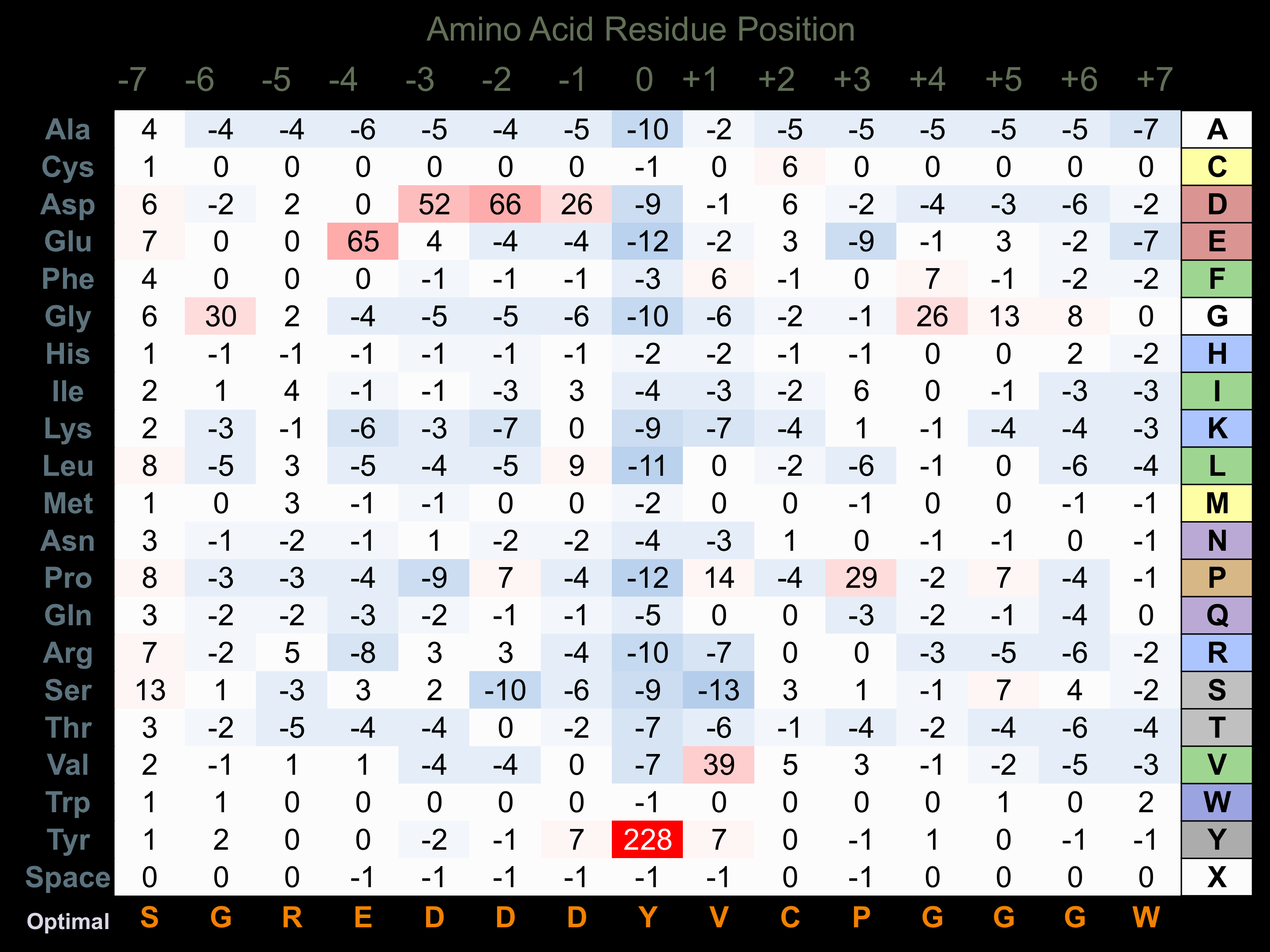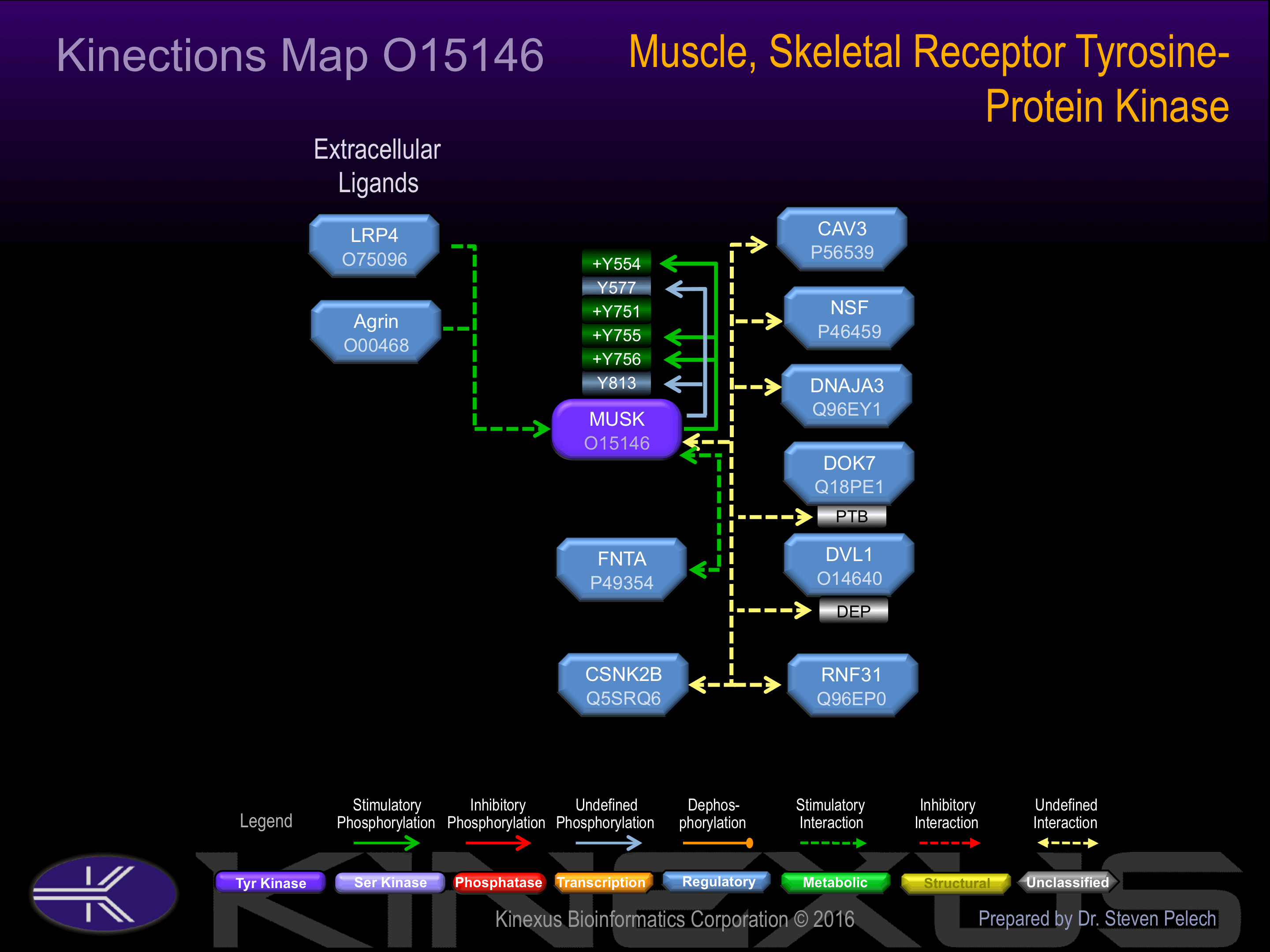Nomenclature
Short Name:
MUSK
Full Name:
Muscle, skeletal receptor tyrosine protein kinase
Alias:
- EC 2.7.10.1
- MGC126323
- MGC126324
- Muscle specific tyrosine kinase receptor
Classification
Type:
Protein-tyrosine kinase
Group:
TK
Family:
Musk
SubFamily:
NA
Specific Links
Structure
Mol. Mass (Da):
97,056
# Amino Acids:
869
# mRNA Isoforms:
3
mRNA Isoforms:
97,056 Da (869 AA; O15146); 87,598 Da (783 AA; O15146-2); 86,425 Da (773 AA; O15146-3)
4D Structure:
Interacts with DOK7, which probably regulates its activity By similarity. Interacts with PDZRN3; this interaction is enhanced by agrin
1D Structure:
3D Image (rendered using PV Viewer):
PDB ID
Subfamily Alignment

Domain Distribution:
Kinexus Products
Click on entries below for direct links to relevant products from Kinexus for this protein kinase.
hiddentext
Post-translation Modifications
For detailed information on phosphorylation of this kinase go to PhosphoNET
N-GlcNAcylated:
N222, N338.
Serine phosphorylated:
S293, S424, S430, S435.
Threonine phosphorylated:
T31, T294.
Tyrosine phosphorylated:
Y554+, Y577, Y751+, Y755+, Y756+, Y813.
Distribution
Based on gene microarray analysis from the NCBI
Human Tissue Distribution
% Max Expression:
Mean Expression:
Number of Samples:
Standard Deviation:
% Max Expression:
Mean Expression:
Number of Samples:
Standard Deviation:
 100
100
630
32
1047
 3
3
22
18
27
 5
5
32
14
39
 33
33
206
123
754
 50
50
313
33
237
 0.8
0.8
5
83
5
 30
30
192
45
414
 51
51
320
43
453
 39
39
248
17
201
 7
7
44
124
74
 5
5
31
41
35
 67
67
421
186
456
 3
3
17
36
20
 2
2
13
12
15
 5
5
30
21
29
 1
1
7
20
10
 3
3
20
211
20
 6
6
37
19
40
 5
5
30
114
27
 43
43
274
137
275
 3
3
20
33
22
 3
3
18
32
17
 4
4
25
17
23
 4
4
26
26
22
 3
3
21
28
24
 56
56
352
71
404
 2
2
14
39
11
 3
3
20
26
23
 3
3
20
24
26
 7
7
45
42
45
 36
36
228
24
228
 98
98
618
41
867
 53
53
333
108
905
 90
90
570
78
494
 5
5
31
48
18
Evolution
Species Conservation
PhosphoNET % Identity:
PhosphoNET % Similarity:
Homologene %
Identity:
PhosphoNET % Identity:
PhosphoNET % Similarity:
Homologene %
Identity:
 100
100
100
100 25.8
25.8
42.9
93 99.2
99.2
99.5
- -
-
-
94 -
-
-
- 81
81
82.6
91 -
-
-
- 93.1
93.1
96.4
90 93.4
93.4
96.9
93 -
-
-
- 82.7
82.7
90.3
- 71.4
71.4
81
70 20.2
20.2
35.5
85 59.1
59.1
70.8
- -
-
-
- 29.9
29.9
45
37 33.6
33.6
48.3
- -
-
-
- 22.5
22.5
40
- -
-
-
- -
-
-
- -
-
-
- -
-
-
- -
-
-
- -
-
-
-
For a wider analysis go to PhosphoNET Evolution in PhosphoNET
Regulation
Activation:
NA
Inhibition:
NA
Synthesis:
NA
Degradation:
NA
Known Upstream Kinases
For further details on these substrates click on the Substrate Short Name or UniProt ID. Phosphosite Location is hyperlinked to PhosphoNET
predictions.
Based on in vitro and/or in vivo phosphorylation data
| Kinase Short Name | UniProt ID (Human) | Phosphosite Location | Phosphosite Sequence | Effect of Phosphorylation |
|---|
Known Downstream Substrates
For further details on these substrates click on the Substrate Short Name or UniProt ID. Phosphosite Location is hyperlinked to PhosphoNET
predictions.
Based on in vitro and/or in vivo phosphorylation data
| Substrate Short Name | UniProt ID (Human) | Phosphosite Location | Phosphosite Sequence | Effect of Phosphorylation |
|---|
Protein Kinase Specificity
Matrix of observed frequency (%) of amino acids in aligned protein substrate phosphosites

Matrix Type:
Predicted from the application of the Kinexus Kinase Substrate Predictor Version 2.0 algorithm, which was trained with over 10,000 kinase-protein substrate pairs and 8,000 kinase-peptide substrate pairs.
Domain #:
1
Inhibitors
For further details on these inhibitors click on the Compound Name and enter it into DrugKiNET or click on the ID's
Based on in vitro and/or in vivo phosphorylation data
| Compound Name | KD, Ki or IC50 (nM) | PubChem ID | ChEMBL ID | PubMed ID |
|---|
Disease Linkage
General Disease Association:
Neurological, and endocrine disorders
Specific Diseases (Non-cancerous):
MUSK-related congenital myasthenic syndrome; Congenital myasthenic syndrome; Myasthenia gravis; Congenital myasthenic syndrome associated with acetylcholine receptor deficiency; Myasthenic syndrome, congenital, associated with facial dysmorphism and acetylcholine receptor deficiency; Lambert-Eaton myasthenic syndrome; Endplate acetylcholinesterase deficiency; Progressive bulbar palsy; Myasthenic syndrome, congenital, with pre- and postsynaptic defects
Comments:
Mutations of MUSK at M605I, A727V, and V790M are associated with myasthenic syndrome, congenital, associated with acetylcholine receptor deficiency (CMS-ACHRD). CMS-ACHRD is a post-synaptic congenital myasthenic syndrome with inherited disorders of neuromuscular transmission.
Gene Expression in Cancers:
The COSMIC website notes an up-regulated expression score for MUSK in diverse human cancers of 240, which is 48% lower than the average score of 462 for the human protein kinases. The down-regulated expression score of 0 for this protein kinase in human cancers was 100% lower than the average score of 60 for the human protein kinases.
Mutagenesis Experiments:
Insertional mutagenesis studies in mice have not yet revealed a role for this protein kinase in mouse cancer oncogenesis.
Mutation Rate in All Cancers:
Percent mutation rates per 100 amino acids length in human cancers: 0.09 % in 25406 diverse cancer specimens. This rate is only 22 % higher than the average rate of 0.075 % calculated for human protein kinases in general.
Mutation Rate in Specific Cancers:
Highest percent mutation rates per 100 amino acids length in human cancers: 0.55 % in 865 skin cancers tested; 0.42 % in 1329 large intestine cancers tested; 0.36 % in 603 endometrium cancers tested; 0.33 % in 589 stomach cancers tested; 0.14 % in 1956 lung cancers tested; 0.14 % in 1512 liver cancers tested; 0.08 % in 710 oesophagus cancers tested; 0.08 % in 273 cervix cancers tested; 0.08 % in 1276 kidney cancers tested; 0.07 % in 1490 breast cancers tested; 0.06 % in 833 ovary cancers tested; 0.05 % in 441 autonomic ganglia cancers tested; 0.04 % in 942 upper aerodigestive tract cancers tested; 0.04 % in 548 urinary tract cancers tested; 0.04 % in 1467 pancreas cancers tested.
Frequency of Mutated Sites:
Most frequent mutations with the number of reports indicated in brackets: E414Q (5).
Comments:
Only 2 deletions, 1 insertion, and no complex mutations are noted on the COSMIC website.


